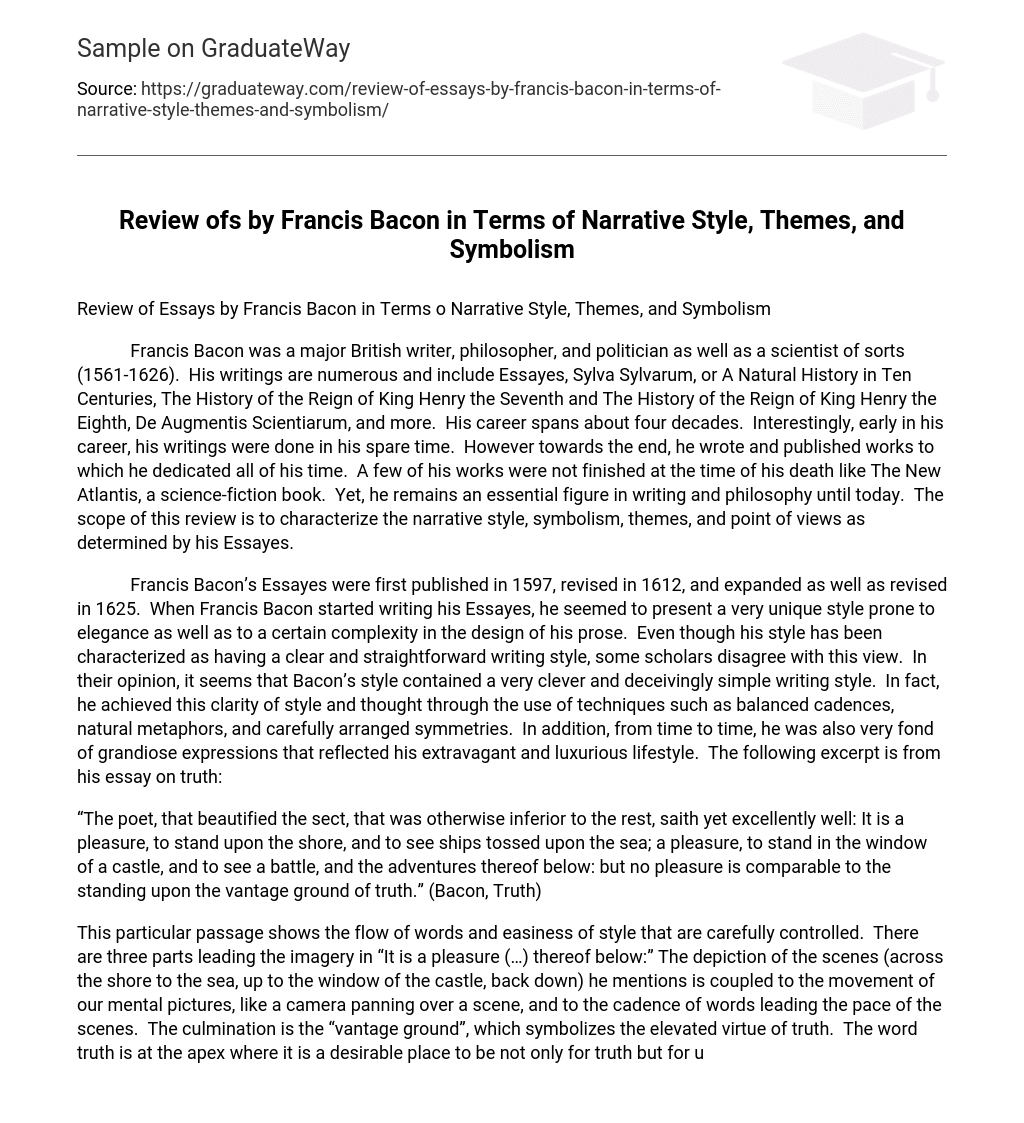Francis Bacon was a major British writer, philosopher, and politician as well as a scientist of sorts (1561-1626). His writings are numerous and include Essayes, Sylva Sylvarum, or A Natural History in Ten Centuries, The History of the Reign of King Henry the Seventh and The History of the Reign of King Henry the Eighth, De Augmentis Scientiarum, and more. His career spans about four decades. Interestingly, early in his career, his writings were done in his spare time.
However towards the end, he wrote and published works to which he dedicated all of his time. A few of his works were not finished at the time of his death like The New Atlantis, a science-fiction book. Yet, he remains an essential figure in writing and philosophy until today. The scope of this review is to characterize the narrative style, symbolism, themes, and point of views as determined by his Essayes.
Francis Bacon’s Essayes were first published in 1597, revised in 1612, and expanded as well as revised in 1625. When Francis Bacon started writing his Essayes, he seemed to present a very unique style prone to elegance as well as to a certain complexity in the design of his prose. Even though his style has been characterized as having a clear and straightforward writing style, some scholars disagree with this view. In their opinion, it seems that Bacon’s style contained a very clever and deceivingly simple writing style.
In fact, he achieved this clarity of style and thought through the use of techniques such as balanced cadences, natural metaphors, and carefully arranged symmetries. In addition, from time to time, he was also very fond of grandiose expressions that reflected his extravagant and luxurious lifestyle. The following excerpt is from his essay on truth:
“The poet, that beautified the sect, that was otherwise inferior to the rest, saith yet excellently well: It is a pleasure, to stand upon the shore, and to see ships tossed upon the sea; a pleasure, to stand in the window of a castle, and to see a battle, and the adventures thereof below: but no pleasure is comparable to the standing upon the vantage ground of truth.” (Bacon, Truth)
This particular passage shows the flow of words and easiness of style that are carefully controlled. There are three parts leading the imagery in “It is a pleasure (…) thereof below:” The depiction of the scenes (across the shore to the sea, up to the window of the castle, back down) he mentions is coupled to the movement of our mental pictures, like a camera panning over a scene, and to the cadence of words leading the pace of the scenes.
The culmination is the “vantage ground”, which symbolizes the elevated virtue of truth. The word truth is at the apex where it is a desirable place to be not only for truth but for us as well. This following passage is taken from another essay Of Simulation and Dissimulation: “As for talkers and futile persons, they are commonly vain and credulous withal. For he that talketh what he knoweth, will also talk what he knoweth not.” (Bacon, Of Simulation and Dissimulation)
In this except, he is straightforward and shows a certain reflection and observation on the mentality of certain individuals he may have encountered in a social context. This short statement highlights an idea or a thought that everyone must have had at some time when meeting people. When reading it, it makes us smile because we can picture mentally at least one person who fits this description.
His works were recognized by other writers and philosophers of the 17th and 18th Centuries. For example, Voltaire wrote a book called Letters on the English, which contains praises of Francis Bacon’s works. Voltaire analyzed Bacons’ writings and found that he indeed was a great writer and the father of experimental philosophy. (Anderson, 1962) He revolutionized philosophy by applying induction to the philosophical process instead of the accepted Medieval Scholasticism.
In particular, Francis Bacon proceeded to develop inductive reasoning. Remarkably, Bacon could see that the only knowledge of importance to man was empirically entrenched in nature and that a clear system of scientific investigative ‘mental methods’ would assure man’s dominion over the world. His basic outline of thought was from fact, to axiom, to law. His inductive reasoning became the basic for the rigor of scientific thinking. Bacon said: “A little philosophy inclineth man’s mind to atheism, but depth in philosophy bringeth men’s minds about to religion.” (Bacon, Of Atheism)
In conclusion, Francis Bacon has been one of the most influential figures of British literature. Bacon’s works are diverse but all possess his vibrant, elegant, and rhythmic style of words coupled to imagery and symbolism. His Essayes were written on many different aspects of intellectual and philosophical topics that in effect give us a picture of his genius as a writer, as well as philosopher and, scientist.
References
- Fish, Stanley E. “The Experience of Bacon’s Essays.” In Self-Consuming Artifacts. Berkeley, CA: University of California Press, 1972.
- Anderson, F. H. Francis Bacon: His Career and His Thought. Los Angeles: University of Southern California Press, 1962.





